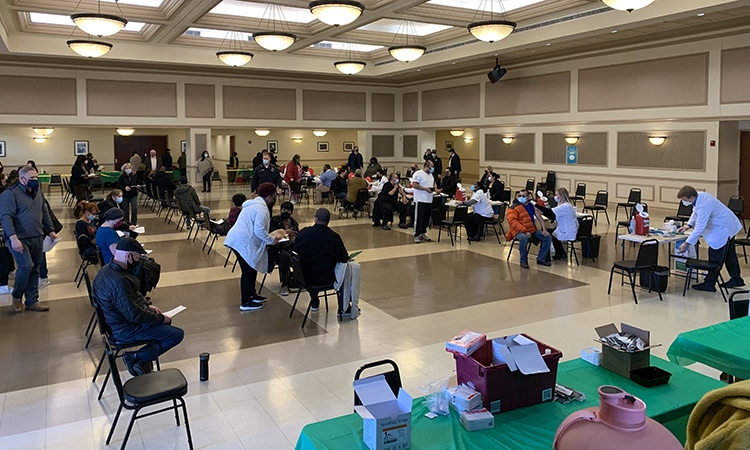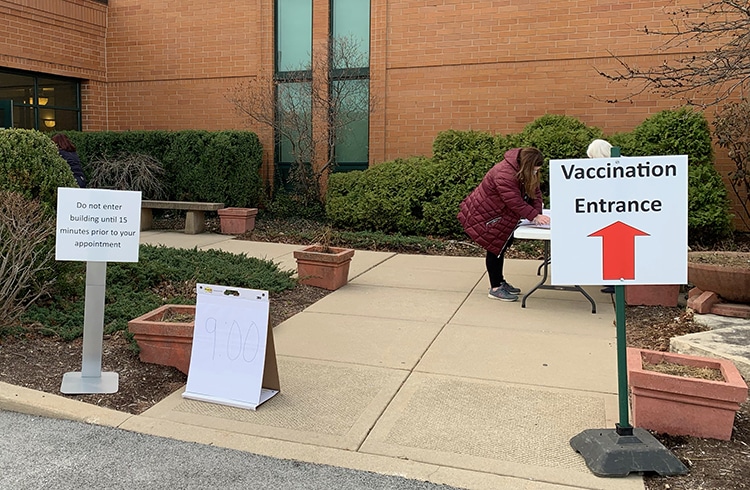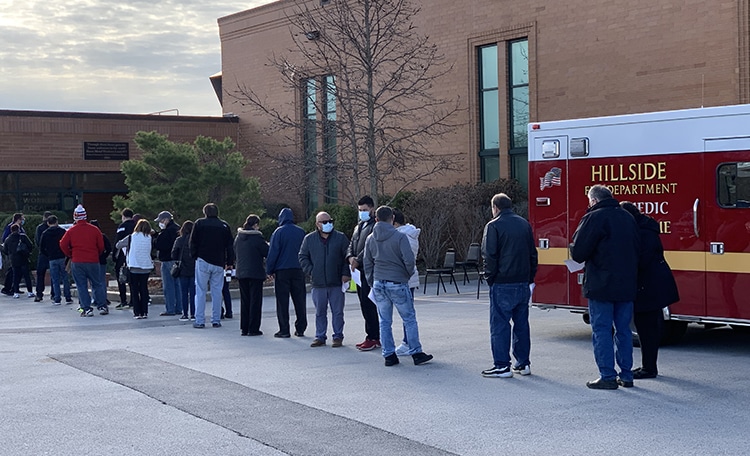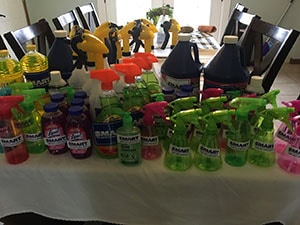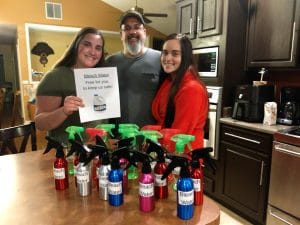Terri Poole Taylor Kerns, 52, of Local 1971 (Atlanta, Ga.) lost her life to COVID-19 on Friday, September 10. Diagnosed with COVID-19 on August 24, she was hospitalized Sunday, August 29 with severe chest pains. After suffering from cardiac arrest, she passed in the early hours of Sept. 10.
In her free time Kerns enjoyed family vacations on the beach. Her true passion was spending time with her husband, children and grandchildren.
“Terri had a great love for her family. Family was everything to Terri, and she left an indescribable imprint on all of us,” her younger sister Joy Poole said.
She’s survived by her husband of 21 years, Paul Henry Kerns Jr. aka PJ; four children, Drew (Sadina) Kerns, Shadonna Kerns, Madison Kerns and Dominique Kerns; two grandsons, Ameer and Zelmeer Kerns; two sisters, Rhonda (James) Poole Farley and Joy (Greg Cowan) Poole; and many in-laws, nieces, nephews, aunts, uncles and cousins. Kerns is preceded in death by her parents, Oddis Theodore Poole Jr. and Patsy Mitchell Arey; grandparents; mother-in-law, Bonnie Jo Kerns; niece, Mariah Turner; nephew, Andrew Sifford; and great nephew, Xander Tucker.
SMART-TD offers their sincere condolences to all who knew and worked with Kerns, as well as her friends and family.
Click here to leave condolences for the family.
Tag: coronavirus

Now the world is starting to open back up after more than a year of being isolated from families and friends. Many people are asking, “How do we ever get back to being normal?” One thing we can do is get vaccinated. Vaccines are now available to all people over the age of 12, and they are reducing the number of COVID-19 deaths and severe illnesses. In fact, 79.5% of those fully vaccinated are people 65 years or older. The COVID-19 vaccine is free to all Medicare beneficiaries.
Even though the pandemic is not over, (with the Delta variant a new concern) it is under better control. Americans are starting to travel again, see family and attend events with larger crowds. While these are good things, some of this news can cause many people to feel overwhelmed. According to the Centers for Disease Control and Prevention (CDC), “It is natural to feel stress, anxiety, grief and worry during the COVID-19 pandemic.”
Below are ways that you can help yourself, others and your community manage stress:
- Turn the TV off. Reduce exposure to news stories, which can trigger stress.
- Eat healthy, go for a walk and get plenty of sleep.
- Find a new hobby or make time to do an old one.
- Connect with others either in person or by phone.
- Connect with your community or faith-based organizations. (CDC, 2021)
While we all wait for the World Health Organization to declare the COVID-19 pandemic over, we must still take proper precautions to ensure safety. If you are unvaccinated, according the CDC, you will still need to wear your mask. Seeing others not wearing a mask may also be stressful because you can’t be sure they are vaccinated.
If you are having trouble managing your feelings or not feeling like yourself, see your doctor or other approved healthcare provider and tell them how you are feeling. Don’t wait until your next annual wellness visit. Even if you don’t feel up to (or ready to face) getting out for a visit, many doctors today are offering telehealth visits. Some Medicare benefits you may not know of include:
- Yearly depression screening
- Diagnostic testing
- Family counseling
- Psychiatric evaluation
- Individual and group psychotherapy
- Medication management
- Annual wellness visit
- Caregiver-focused behavioral health risk assessment of their own behavior and health risks, which benefits the patient
- Cognitive assessment and care planning
- Drug therapy
- Drug withdrawal treatment and other substance use disorder treatments
- Hypnotherapy
- Initial Preventive Physical Examination (IPPE) to review medical and social health history and provide preventive services education
For more information about your Medicare benefits and how they can help you get help when you’re feeling down, please call Palmetto GBA’s beneficiary contact center at 800-833-4455, Monday through Friday, from 8:30 a.m. to 7 p.m. ET. You are also encouraged to sign up for Palmetto’s email updates. To do so, click “Email Updates” on the top banner on the Palmetto GBA website at www.PalmettoGBA.com/RR/Me to start the process.
If you’d like to read more about the CDC and its information on coping with stress related to the coronavirus, please visit their website: https://www.cdc.gov/coronavirus/2019-ncov/daily-life-coping/managing-stress-anxiety.html
Palmetto GBA is the Railroad Specialty Medicare Administrative Contractor (RRB SMAC) and processes Part B claims for Railroad Retirement beneficiaries nationwide. Palmetto GBA is contracted by the independent federal agency Railroad Retirement Board (RRB), which administers comprehensive retirement-survivor and unemployment-sickness benefit programs for railroad workers and their families under the Railroad Retirement and Railroad Unemployment Insurance Acts.
Photos by Dave Sylvester, Local 73
Hillside, Ill. – SMART SM Local 73 is partnering with Proviso Township and Jewel-Osco to provide added capacity for COVID-19 vaccine distribution efforts, with its union hall functioning as a vaccine injection site. More than 1400 vaccines were administered today between 9am and 4pm at the local hall in Hillside, just west of downtown Chicago, for residents of any of the 15 villages in Proviso Township.
“This wouldn’t be happening in Hillside today without Local 73 stepping up and helping out,” said Hillside Mayor Joseph Tamburino, who was at the vaccination site throughout the day. “They set the room up and did everything we asked them to do and it’s fantastic. Their facility is just perfect for this.”
The union hall effectively functioned as a one-day pop-up vaccine clinic. The site was thoroughly cleaned and prepped ahead of time and a sanitation crew will be coming Monday night and doing a deep clean of the space.
“This wouldn’t be happening in Hillside today without Local 73 stepping up and helping out.”
– Hillside (Ill.) Mayor Joseph Tamburino
“We are proud to partner with Proviso Township, Jewel-Osco and Mayor Tamburino to provide a safe, convenient location for members of our community to receive their vaccine,” said Local 73 President and Business Manager Raymond Suggs. He added that the local is looking to help with additional vaccination days in coming weeks, depending on vaccine availability.
Nationally, SMART is part of a coordinated effort by U.S. building trades unions to make their facilities available to President Biden’s COVID-19 Relief Task Force for U.S. vaccine distribution. In February, the Governing Board of Presidents of North America’s Building Trades Unions (NABTU) voted unanimously to offer more than 5,000 union halls and training centers to the vaccine distribution effort.

As the vaccinations roll out, we are receiving questions about the process, and we would like to share them and the answers with you. They are:
What does the vaccine cost?
The vaccine is free. Medicare will pay your provider for administering the vaccine, and you will not be charged in any way. If a provider tries to collect co-pays or any other types of funds specific to the coronavirus vaccine (such as coinsurances or deductibles), please call our office and let us know.
How is the vaccine being distributed?
Every state has its own vaccine distribution plan, and you can access that information from each state’s health department. To find a listing of states and their health departments, their websites and phone numbers, please see the article “What You Don’t Know May Make A Difference” on the Palmetto GBA website at www.PalmettoGBA.com/RR/Me. You can also find a listing on the Centers for Disease Control and Prevention (CDC) website at www.CDC.gov.
Where can I find out more about the individual vaccines?
There are two vaccines being used. They are Pfizer-BioNTech COVID-19 vaccine and Moderna’s COVID-19 vaccine. Additionally, per the CDC, there are three large-scale (Phase 3) clinical trials in progress or being planned for three COVID-19 vaccines:
AstraZeneca’s COVID-19 vaccine
Janssen’s COVID-19 vaccine
Novavax’s COVID-19 vaccine
As each vaccine is approved and authorized, the CDC publishes information on who should or should not receive that particular vaccine based on health profiles. Additionally, the CDC will publish information to include the vaccine’s ingredients, its safety and its effectiveness. This information is located on the CDC website at www.cdc.gov/coronavirus/2019-ncov/vaccines/different-vaccines.html.
Can I get my shot sooner if I pay for that?
The vaccine is available based on each state’s distribution program. If someone contacts you and tells you that you can pay to either have your name put on a list to receive the vaccine (when you were not on the list yet to receive the shot) or tells you that you can pay to receive the vaccine sooner than you are scheduled for, do not believe them. These “opportunities” do not exist. And as always, do not share your personal and financial information with people who call, text or email you with any offer like this. Keep your private information private. The government will never call you and ask you for money.
If you have a question about Medicare’s coverage of the coronavirus vaccine, please call Palmetto GBA’s Beneficiary Contact Center at 800-833-4455, or for the hearing impaired, call TTY/TDD at 877-566-3572. Customer service representatives are available Monday through Friday, from 8:30 a.m. until 7 p.m. ET.
You are encouraged to visit the Palmetto GBA website at www.PalmettoGBA.com/RR/Me, as well as enrolling to use their free self-service internet portal, MyRRMed. MyRRMed offers you access to your healthcare data. At this time, you can use the portal to access:
- Status and details of your Railroad Medicare Part B claims
- Historical Medicare Summary Notices (MSNs) for your Railroad Medicare Part B claims
- A listing of individuals you have authorized to have access to your private health information.
- You can also submit a request to add an authorized representative or to edit or remove an existing authorized representative.
To sign up for MyRRMed, please visit the site at www.PalmettoGBA.com/MyRRMed.
Palmetto GBA is the Railroad Specialty Medicare Administrative Contractor (RRB SMAC) and processes Part B claims for Railroad Retirement beneficiaries nationwide. Palmetto GBA is contracted by the independent federal agency Railroad Retirement Board (RRB), which administers comprehensive retirement-survivor and unemployment-sickness benefit programs for railroad workers and their families under the Railroad Retirement and Railroad Unemployment Insurance Acts.
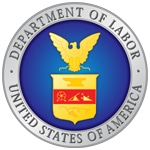
During the coronavirus outbreak, OSHA area offices will utilize their inspection resources to fulfill mission essential functions and protect workers exposed to the disease. The response plan contains interim procedures that allow flexibility and discretion for field offices to maximize OSHA’s impact in securing safe workplaces in this evolving environment.
“OSHA is committed to protecting the health and safety of America’s workers during this challenging time in our nation’s history,” Principal Deputy Assistant Secretary Loren Sweatt said. “Today’s guidance outlines commonsense procedures for investigating complaints related to the coronavirus, while also ensuring the safety of workers, employers and inspectors.”
The response plan outlines procedures for addressing reports of workplace hazards related to the coronavirus. Fatalities and imminent danger exposures related to the coronavirus will be prioritized for on-site inspections. The response plan contains procedures and sample documentation for CSHOs to use during coronavirus-related inspections. Workers requesting inspections, complaining of coronavirus exposure or reporting illnesses may be protected under one or more whistleblower statutes and will be informed of their protections from retaliation.
This memorandum will take effect immediately and remain in effect until further notice. It is intended to be time-limited to the current public health crisis. Check OSHA’s webpage at www.osha.gov/coronavirus frequently for updates.
Under the Occupational Safety and Health Act of 1970, employers are responsible for providing safe and healthful workplaces for their employees. OSHA’s role is to help ensure these conditions for America’s working men and women by setting and enforcing standards, and providing training, education and assistance. For more information, visit www.osha.gov.
The mission of the Department of Labor is to foster, promote and develop the welfare of the wage earners, job seekers and retirees of the United States; improve working conditions; advance opportunities for profitable employment and assure work-related benefits and rights.
As more people are being diagnosed with COVID-19 or coronavirus, it is important to know who you have come into contact with on a daily basis. State health departments, employers and the infected themselves have been having a difficult time in determining and/or remembering who the infected person may have come into contact with in trying to trace possible infection vectors.
The Bailey Yard in Nebraska was one of the first railroad yards hit with the virus. As the first patient was identified and put into isolation along with other railroad employees who had come into contact with the patient, one thing became clear: not everyone who had come into contact with the infected person had been identified. As a second person was identified as having the virus, the same problem occurred.
“As vice local chairperson, I was getting calls from employees wondering why they weren’t notified as they had been in contact with one or the other of the positive people. I didn’t have an answer, and we discovered that the positive person bears the burden of knowing who they had been around and are asked this days after they’d been in isolation,” said Amanda Snide of SMART Transportation Division Local 200 in North Platte, Neb.
“We potentially come in contact with so many people during our shifts that it can be hard to keep track of who you were with on what days,” she said. “I have been sharing that I am personally keeping track of whom I’ve been in contact with during my shift. During interactions with other employees I explain why I’m writing their names down and encouraging others to do so.
“Whenever someone new calls to be assisted in the process of being taken out of service as they aren’t feeling well, I tell them to start making a list of who they have been around both at work and outside of work. For someone to have been in contact with a sick person, only to find out days after everyone else is pulled from service, would be a sickening feeling that you potentially spread this unknowingly.”
By taking Snide’s advice in writing down names and contact information, we can be sure that we know exactly whom we’ve been in contact with should the worst occur and then can more easily identify others who have come into contact with the virus.
Snide says that in addition to writing down names and contact information, she also takes steps to keep her family safe. Her work boots stay outside, and she doesn’t touch anything in her home until her work clothes are in the washing machine and she’s showered.
As COVID-19 has infiltrated the bus and rail industries, it’s important that members do their best to try to mitigate its spread. As Snide has suggested, we are recommending that all of our members write down who they have come into contact with each day and keep that list for at least a month. Doing so will help identify who may have been exposed if you come down with the virus.
We need to work together to keep ourselves and our union brothers and sisters safe. Another way is by reporting how your carrier is adhering to Centers for Disease Control and Prevention (CDC) protocols.
COVID-19 has hit the transit industry hard with hundreds of cases among passengers and workers alike reported through the media. Only a few cases have been reported on freight carriers thus far, but knowing the conditions that have been reported to the union and the delay by federal agencies to take action, the freight industry could be harder hit. The bus industry has started to report cases as well with Santa Monica’s Big Blue Bus just reporting two cases among their bus operators.
Please see this guide produced by OSHA on how to keep yourself and your co-workers safe, and be careful out there!
As COVID-19 has spread across the country, some carriers and businesses have been caught flat-footed in dealing with the pandemic as indicated by field reports we’ve received from members.
The same cannot be said for front-line SMART Transportation Division members who have sprung into action to help their communities and fellow members cope with the effects of the coronavirus.
General Chairperson Justin Wolters (GCA-449) was able to engineer an agreement with a local distillery that provided alcohol-based hand sanitizer to members free of charge.
“I explained our travel ban exemption and our lack of access to running water,” Wolters said. “They seemed more than happy to help our union.
“I decided I can’t rely on the carrier to protect the members, so our officers are donating cleaning materials daily and cleaning when they can.”
Attention to sanitation of work areas also has been a challenge that General Chairperson Larry Miller (GO 386) is doing his best to help meet by providing disinfecting wipes to workers in packages provided by the union.
“I wanted to do all I can on my part to keep our members supplied with whatever I could get at our local stores,” said Miller, who was elected an alternate vice president at last year’s Second SMART-TD Convention. “I know it is not a lot, but it does make a dent. If we all pull together as the SMART-TD team, we will get through this.”
Member Mike Speier of Local 6 (Indianapolis, Ind.) took the initiative of purchasing a number of spray bottles from the dollar store, mixing up a bleach solution with four gallons that he purchased on his own, and then placing the filled spray bottles around the yard office.
“They can put posters up when the cows come home, but that’s not keeping us safe,” Speier said. “It’s cheap to do, I followed the instructions on Google and have been filling them up and giving them to the guys.
If managers would give workers a bit of extra time to sanitize and disinfect their worksites — about 10 minutes — and allow the people to pull together, it’d help to reduce the risk of the coronavirus spreading, he said.
“You have a half-dozen guys buy bottles and bleach water, and we can really nip this in the bud,” Speier said.
Some members are doing their best to keep others informed.
On the West Coast, General Chairperson James Sandoval of the Santa Cruz Metropolitan Transit District and Local 23 (Santa Cruz, Calif.) alternate legislative representative, has been sharing information with members across TD locals and transit agencies alike to help spread information during the outbreak. In particular he is raising awareness about federal and state benefits that are available especially for those who may find themselves unable to work because they or someone they care for is dealing with COVID-19.
“Since we are in uncharted waters with this pandemic, it is extremely important to support each other and share information that may help because there is no book on this,” he said. “I have been sharing information with all District 3 general chairpersons, our International, our local labor counsel and other unions. We must step up to make sure nobody feels alone right now because things are changing at a rapid pace.”
Sandoval says that a cooperative effort has brought about shift adjustments at both Santa Cruz’s bus and paratransit properties by the carrier, which also has eliminated disciplinary procedures on sick calls, begun a no-question 10-day stay-at-home policy, supplied personal protective equipment and implemented bus sanitation practices.
“I couldn’t have accomplished improving our workplace strategy around COVID-19 to help protect our members without the support of my great team at our local. I have always believed that working together means we can get through anything — we will come out of this stronger than ever!”
Johnny Walker, legislative representative for Local 610 and secretary of the Maryland State Legislative Board, has been using his experience in the military and as a railroader to help pull people in his neighborhood and at his workplace together to cope with the stresses posed by the pandemic.
Walker wrote a guest column published on the SMART-TD website talking about how members will be essential in guiding the country through this challenge.
New Jersey State Legislative Director Ron Sabol also has been working closely with the state AFL-CIO to distribute information to members, especially members employed by New Jersey Transit, which has been particularly hard-hit by the pandemic.
He praised the efforts of General Chairperson Jerome Johnson (New Jersey Transit conductors) of Local 60 in Newark, as doing an exemplary job in keeping things moving in this time of crisis, as are other NJT members.
“He has been doing everything he possibly can to protect his members and the riding public. After all, NJT operates in and out of New York City,” Sabol said. “Our N.J. bus members as well have been dealing with fuller buses because of route cuts.”
These examples, as well as other members’ efforts that haven’t yet been reported to us at news_TD@smart-union.org, are what’s going to keep the country moving and our fellow brothers and sisters healthy as we all work through the challenge of this pandemic.
And don’t forget that there’s a form where members can report conditions not meeting CDC guidelines to prevent the spread of COVID-19.
Union leadership is reviewing each and every submission and is working to get those problem areas resolved, but keep in mind it is impossible for your general chairperson or state legislative board to adequately respond if the situations are not reported. The more details we receive, the better chance we have of getting them corrected.
“I read each and every one of these reports, and we all discuss it daily to ensure someone is following up with a corrective action plan,” said Transportation Division President Jeremy R. Ferguson. “Our general chairpersons are doing a fantastic job, and in many cases they are teamed up with our vice presidents in keeping the pressure on the carriers to get the unsanitary conditions and lack of supplies fixed. Our Legislative/Safety Department is following up on the national, state and local levels where needed to ensure members’ voices and concerns are being addressed.”
Chief of Staff Jerry Gibson of the TD President’s Office encourages members to reach out to him at jgibson@smart-union.org for ideas on how SMART-TD members can help pull together resources to assist each other during the coronavirus outbreak. This includes branding supplies with SMART decals so that people know that the union is helping to provide the materials that otherwise would not be available.
A few months ago, I had the opportunity to move a lite engine from customer to customer. I like moves like this because they are different from the normal everyday work of a local road switcher. This move was no different from normal railroading, other than this yard bird caught my attention. It was an old U.S. Army EMD SW8 with its original number and livery poking through the faded paint.
My father-in-law is U.S. Army (retired), a bit of a railfan, and he loves this sort of thing. I wrote down the locomotive’s info. and made the move from plant-to-plant. Long after the train was put to bed and I was home, I decided to do a bit of research on this locomotive wondering if it had ties to my father-in-law’s Army career.
To my surprise, I found out this lonely yard bird was a veteran — not just a transportation corps veteran, but a Korean War veteran. This locomotive has been halfway around the world and in a major conflict and is now retired, shifting coal to provide power to southern Maryland, still doing what it was made to do — railroading.
During this health crisis, I look back to my military career as a U.S. Navy Corpsman and also at my current career. Like this yard bird, many railroaders’ paths crossed both in military and railroad service. These two things make us more versatile in the worst of situations, especially in crisis, and more capable to cope with what the railroad throws at us.
Because of this, we can set an example to our fellow railroad workers and our community. Our military backgrounds in discipline, self-reliance and basic medical care are literally life-saving. Our railroad skills of planning, job briefings, safety, situational awareness, and being tasked to fix anything so that the job gets done make us adaptable in any situation. Both careers together make us unstoppable, no matter what life throws at us.
Living in the D.C. area for 20-plus years, I am unfazed by major incidents locally. I’ve been through numerous blizzards, crippling weather and one minor earthquake. Presidential inaugurations, protests and disruptive visits from dignitaries occur frequently. I’ve lived through the D.C. sniper and September 11th attacks — both instances so close that I had shopped at the Home Depot visited by the snipers and had smelled the Pentagon burning 14 miles away.
In all these events, I was essential personnel — tasked to come in both in a medical role and as a conductor. Since 1997, I, like many of us, know that when you are called there is no voicemail or marking off. This coronavirus has caused this to happen again, and it’s now our time to shine.
This crisis may create panic. However, we have what it takes to get through this. We are prepared for long hours, days away from home, and anything thrown at us. We are also nomads who go where the work is. A lot of us are scattered throughout our divisions and stay at different terminals. We can use this to our advantage. You may be able to find needed items that are in short supply at home, in abundance at other locations. They also might be near the terminals or hotels we lay over in.
As union members we can be ahead of the game with our wide network of resources. Members who are coming to another terminal can get with each other and pool resources. If outlying members can get paper towels and home terminal members can get mac and cheese, trade with each other so both benefit. Schools are closing and lots of our loved ones are teleworking now. Helping keep our home fronts happy and safe will take a load off while the carriers are working us harder than ever in this national state of emergency. Getting rest is important, and it’s going to be potentially harder and more stressful. If you live near a fellow member and can help with childcare or other things, let them know. This too will help with a lot of stresses we have. When laying over if you are able to go out and get supplies, go as a crew so you both can get items if your home needs them and there is a limit to get them. Only get what is needed and don’t hoard — this helps no one.
Lastly, if you like hot lunches or get things from the gas station, make sure you’re prepared for those possible closures. Bring non-perishable alternatives so you are not stuck without food at work or away from home.
As always, we are a crew, so look out for each other if you can. Most times we are the only ones who look out for us. We must keep this up by showing unity through this crisis and beyond.
Get to know your local community and your neighbors. They may not know you or your background or even who you are. My neighbors are mostly government workers who only know my odd hours or that I’m the guy who shovels everyone’s walk in a bad snowstorm. With social distancing they know that I’m still working keeping our country moving. I’ve offered to search other stores for provisions that they may need on my way to and from work. Our trash service was delayed, so while having conversations six feet away, I said I was getting in touch with the trash service to plan on an area away from our homes to stage trash if there is a future disruption, remembering my military sanitary training.
As railroaders, we all have this training and these skills. We know when to use them. I had an old timer tell me, “We are not paid for what we do, we are paid for what we know. You must be a proactive conductor, not a reactive conductor.”
Now more than ever I understand what he meant. Use your skills and training to better our workplace and community in this crisis. Be prepared, vigilant and safe. Please look out for each other in this national state of emergency. And absolutely do not put yourself in danger under the guise of a national emergency. We all need to come home the same way we came into work.
With this and all the amazing things I’ve done over my railroading career. I’m really proud that I can provide service to my country once again even if it’s in a small roll like this. This is an amazing time to be a railroader both in great moments and in hardships. We are the nation’s backbone in transportation. We ship more freight in a day than a trucker does in a lifetime. And for over 150 years we have been supplying this nation with its needs. Through two world wars, the 1918 flu pandemic and numerous other hardships, railroaders have come through. We will not let our nation or each other down.
Be safe, brothers and sisters. We will overcome this. Nothing stops a determined union member.
Johnny R. Walker,
Secretary, Maryland State Legislative Board and Legislative Representative, Local 610 (Baltimore, Maryland)
Union Pacific has announced that a 50-year-old man that works in UP’s Bailey Yard in North Platte, Neb., has tested positive for COVID-19. The employee and a number of co-workers who came into contact with him are currently quarantined at home.
It’s suspected that the man got the virus while traveling to California and vacationing on a cruise ship. UP reports that the man’s work areas have been disinfected and sanitized.
“It’s unfathomable that rail carriers have not yet implemented all CDC guidelines regarding sanitation and COVID-19 prevention efforts from the outset,” SMART Transportation Division President Jeremy Ferguson said. “We are making every effort during this Federal Railroad Administration-declared emergency to get our membership and rail workers the protections they need.”
The man’s name has not been released.
Click here to read more from The North Platte Telegraph or from NBC Nebraska.
The Social Security Administration announced in a press release that effective Tuesday, March 17, 2020, all local offices will be closed to the public. Below is the release.
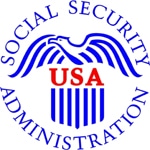 All local Social Security offices will be closed to the public for in-person service starting Tuesday, March 17, 2020. This decision protects the population we serve — older Americans and people with underlying medical conditions — and our employees during the Coronavirus (COVID-19) pandemic. However, we are still able to provide critical services.
All local Social Security offices will be closed to the public for in-person service starting Tuesday, March 17, 2020. This decision protects the population we serve — older Americans and people with underlying medical conditions — and our employees during the Coronavirus (COVID-19) pandemic. However, we are still able to provide critical services.
Our secure and convenient online services remain available at www.socialsecurity.gov. Local offices will also continue to provide critical services over the phone. We are working closely with the Centers for Disease Control and Prevention (CDC), state and local governments, and other experts to monitor COVID-19 and will let you know as soon as we can resume in-person service.
If you need help from Social Security:
- First, please use our secure and convenient online services available at www.socialsecurity.gov/onlineservices. You can apply for retirement, disability, and Medicare benefits online, check the status of an application or appeal, request a replacement Social Security card (in most areas), print a benefit verification letter, and much more – from anywhere and from any of your devices. We also have a wealth of information to answer most of your Social Security questions online, without having to speak with a Social Security representative in person or by phone. Please visit our online Frequently Asked Questions at www.socialsecurity.gov/ask.
- If you cannot conduct your Social Security business online, please check our online field office locator for specific information about how to directly contact your local office. Your local office still will be able to provide critical services to help you apply for benefits, answer your questions and provide other services over the phone.
- If you already have an in-office appointment scheduled, we will call you to handle your appointment over the phone instead. If you have a hearing scheduled, we will call you to discuss alternatives for continuing with your hearing, including offering a telephonic hearing. Our call may come from a PRIVATE number and not from a U.S. Government phone. Please remember that our employees will not threaten you or ask for any form of payment.
- If you cannot complete your Social Security business online, please call our National 800 Number at 1-800-772-1213 (TTY 1-800-325-0778). Our National 800 Number has many automated service options you can use without waiting to speak with a telephone representative. A list of automated telephone services is available online at www.socialsecurity.gov/agency/contact/phone.html.
For more information, please visit https://www.ssa.gov/news/press/releases/.

